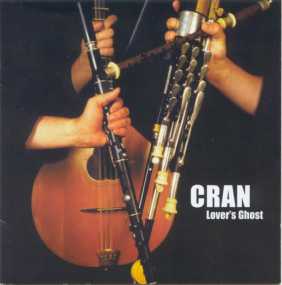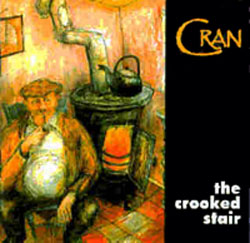![]() *
The Band
*
Concerts
*
Reviews
*
Background & Recipes! *
Agents
*
The Band
*
Concerts
*
Reviews
*
Background & Recipes! *
Agents

Review from CladdaghRecords.com
MUSIC FROM THE EDGE OF THE WORLD. Cran. BRRCD4. This is the best one yet from Cran, a group that realises people like listening to songs as well as tunes. The tunes are as good as anything Planxty ever did, and the songs, in English, Irish and Scots Gaelic, are well chosen. Sean Corcoran has never sung so well on record, and the harmonies by Desi Wilkinson and Ronan Browne are beautiful.
The tunes come from many parts of Ireland, with probably a bias towards Ulster. Each member
plays and each one
sings. Mighty listening.

Review from THE GREEN MAN REVIEW
Who was it that said that one of the best things about reviewing for GMR is being surprised and delighted something truly wonderful? Well, brothers and sisters, Iím here to testify that both are true! CRANís third album, Loverís Ghost, is Irish traditional music at its best, mixing amazing songs and stunning instrumentals.
Cran are Seán Corcoran on lead vocals, bouzouki and guitar; Ronan Brown on uilleann pipes, whistles, flutes, keyboards and vocals; and Desi Wilkinson on flutes whistles and vocals. All three have a long list of credentials and various solo projects, as well as collaborating in this ensemble. Their experience is reflected in Cranís ability to project a rare sense of primitive sophistication through their selection of lesser- known songs, vocal arrangements, and musicianship. This is a powerful album, achieving its effect without showing strain or resorting to anything resembling “loud and fast.” Cran exhibit the sort of depth that younger musicians can only dream about, proving once again that the Celtic folk traditions reward the dedication that leads to mastery.
Itís been a long time coming that I developed a taste for slow unmetered Irish singing, either Gaelic or Hiberno-English, partly because I find that the vast majority of soloists lack the power that can be achieved in ensemble singing. But Cran demonstrate the beauty of this style, making artful use of Corcoranís reedy tenor vocals, joined by Brown and Wilkinson for a verse or chorus. The songs range from work songs to spurned lovers, lonely immigrants to prisoners of fairy. What makes Cranís treatment unique is their arrangement and adaptation of the songs, making the familiar themes seem fresh and mysterious.
One of the best songs is Stolen Bride (An Bhean a Tugadh As), an adaptation of a nineteenth-century song about a young woman stolen by the fairies, using her lullaby to a fairy child to send a coded message to a nearby washerwoman with directions for her release. Corcoran sings the melody over a short chanting refrain by the three vocalists, whose joined voices communicate a sense of her frustration in trying to bridge a gap between worlds and catch the attention of the washerwoman.
The other standout is a song from the Hebrides, sung in Scots Gaelic with translation verses, called Newry Boat Song (Mo Ghille Dubh-dhonn). It is sung from the point of view of a spurned lover whose betrothed has left the island and sailed to Newry for seed potatoes, only to stay on and marry a local girl. The combined voices of the trio create a sense of the jilted loverís despair, as does the rhythmic chorus.
Two immigrant songs grace the album. Erin Grá Mo Chroí is a poignant original about an immigrant to New York, taking a walk to gaze on the scenes of New York while dreaming of home, with the flutes capturing the sense of wistful longing. Captain Thompson, a nineteenth-century song telling of an emigrantís storm-tossed journey to Quebec, uses Corcoranís voice to convey the isolation and longing for home. Browneís pipes create a very mournful sense of the immigrantís resignation, even while toasting the Captainís skill at getting them safely through the squall off Newfoundland.
Itís difficult to explain in print, but Cran have an amazing sense of the language of sounds, the souls of the instruments, and they know how to use them to create the emotional atmosphere that the lyrics convey in words. Many of the vocals gain their sense of power through the repetition of chanting, such as in Stolen Bride or Hó Bó. The latter song has an unusual melody and is a work song sung for ploughing, a type of song which the liner notes report had died out by the end of the nineteenth century.
The instrumentals are effectively placed and well balanced, enjoyable in their own right and creating anticipation for the next song or tune. I particularly liked the pairing of the flute and pipe in the introduction to the slow air After Dawning, followed by a lovely uilleann pipe solo. Cran are incredibly effective at creating a sense of tension and pacing in the slow songs -- yet another thing that sets them above many of their contemporaries. These guys know how to take turns, also, switching between pipes and flutes for the melody, making full use of the trioís musical vocabulary.
Cran also use vocal arrangements to create continuity with their instrumentals. The drone of the pipes is part of what gives them a sense of magic. Like the digeridoo, there is just something exciting about that constant low sound. Yet vocal drones can create that same sense, and Cran does just that on Oakum (Sé Oakum Mo Phriosúin), a mournful ballad of an oakum picker, sentenced to the workhouse to pull ropes apart for use in caulking ships.
Have I used enough superlatives yet? If you want to really experience Irish traditional music, to get beyond the flash of young and enthusiastic traditionalists, or loud and fast rock adaptations (fond as we are of them!) to the generative substrate where the magic is created, you should get this album. It demonstrates both mastery and artistry. But be warned: it may be difficult to remove from the CD player.
[Kim Bates]
Buy from
Claddagh Records
UK
ONLINE SHOP ![]()

Review from FOLK ROOTS MAGAZINE
No shortage of pedigree here. Some of the greatest names in Irish traditional music lurk beneath CRAN - Ronan Browne on uilleann pipes, Desi Wilkinson on flute, Seán Corcoran on bouzouki, and guests Kevin Glackin on fiddle and Bothy Band founder Tríona Ní Dhomhnaill on clavinet and harmonium. Add the harmonies of Anúna on the title track, the occasional assured vocal from Corcoran and performances of impeccable taste and restraint and you have one of the superior Irish albums of the year. Ears blunted by the brash thunder of some of the younger bands (or indeed the mystical vacuousness of the despicable newage Celts) may have initial problems relating to its easy subtleties, but playing of the accomplished purity of Browne's piping and Wilkinson's flute should swiftly seduce away such cloth-eared preconceptions. Shel Talmy is involved, too, as producer on a well-balanced selection of material which eases stylishly from reels to songs to jigs to ballads to the odd suggestion of a style unafraid to dip the odd toe into a more distant tradition. Spooky strings decorate Farewell To Nigg and there's an intriguing Eastern flavour to Staimpí. The title track itself is even something of an epic, Browne's brooding pipes and Anúna's mysterious backing vocals transporting the whole thing into the realms of a soundtrack to a murder mystery. Corcoran's vocals, too, are pleasingly relaxed and laid back - there are shades of Len Graham about his singing on Coleraine Town. It's a lovely album, and when they all shift into top gear on The Return From Fingal set of jigs, the overall sound is utterly magnificent. It bridges the gap between the straight ahead traditional correctness of Moving Cloud and the devil-may-care flamboyance of... well, the Bothy Band.
Colin Irwin - FOLK ROOTS
Buy from
Claddagh Records
UK
ONLINE SHOP ![]()

THE CROOKED STAIR
CRAN's legendary debut album, released in 1995 on the now-notorious (but, happily, defunct) CBM label. Ronan Browne was still just a twinkle in CRAN's eye at the time and the line-up was Seán, Desi and Belfastman Neil Martin who played uilleann pipes and cello. The album soon achieved an " underground cult status " for its quirky arrangements and big vocal style - which has since become a CRAN hallmark. Unfortunately, despite being much sought-after, it's at present unavailable due to legal disputation, so if you have a copy lock it away safe at night!
RE-RELEASED DEC. 2005!!